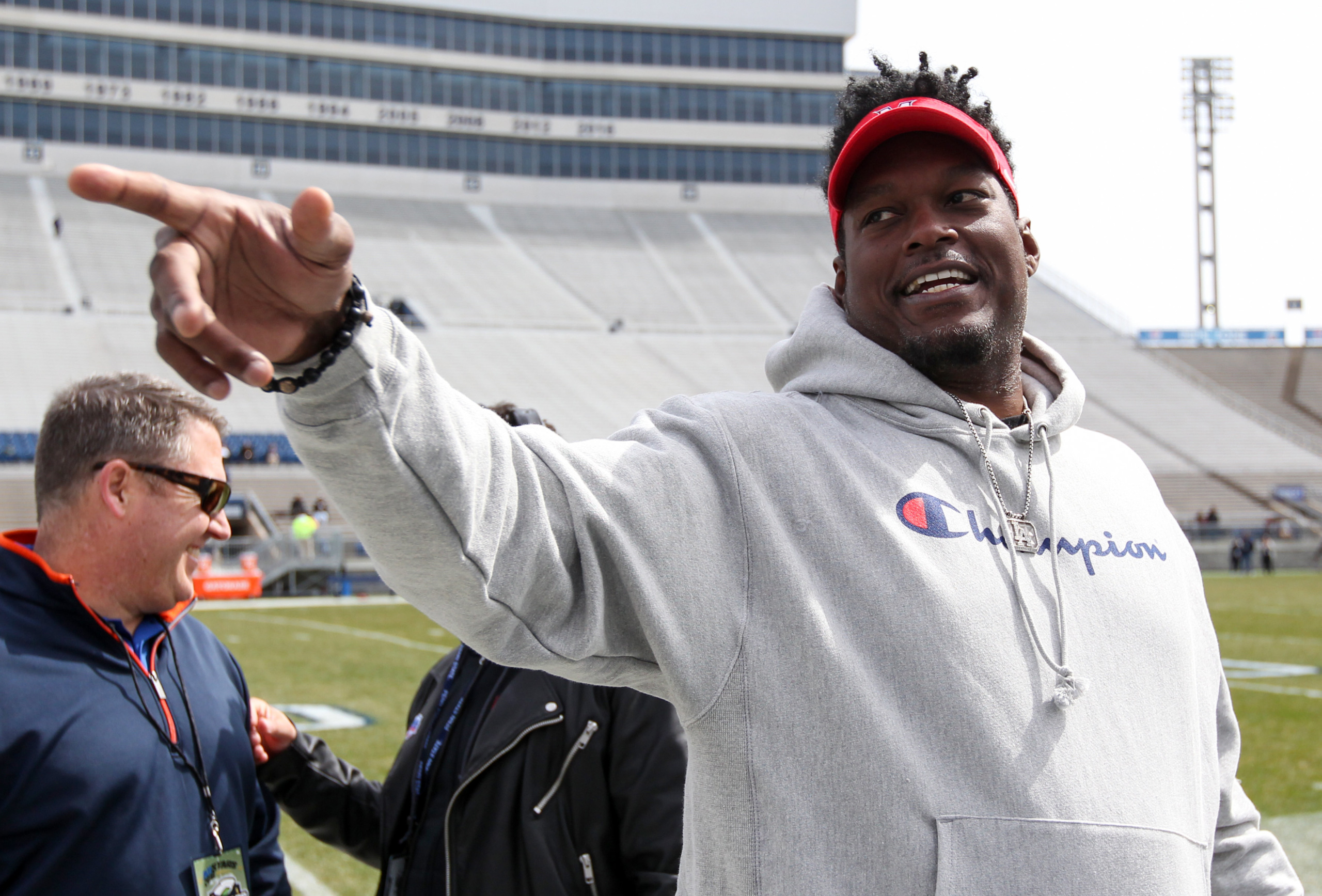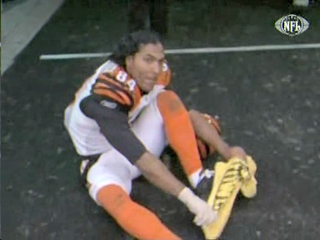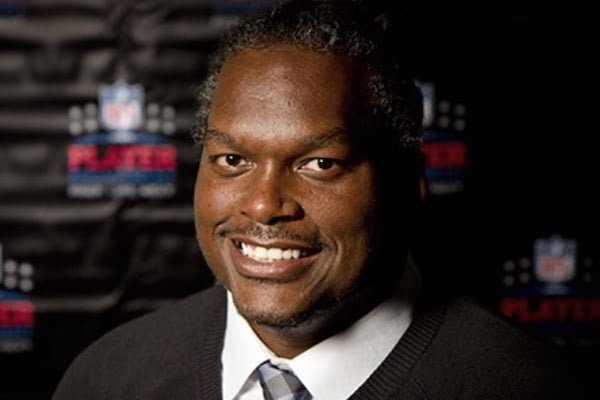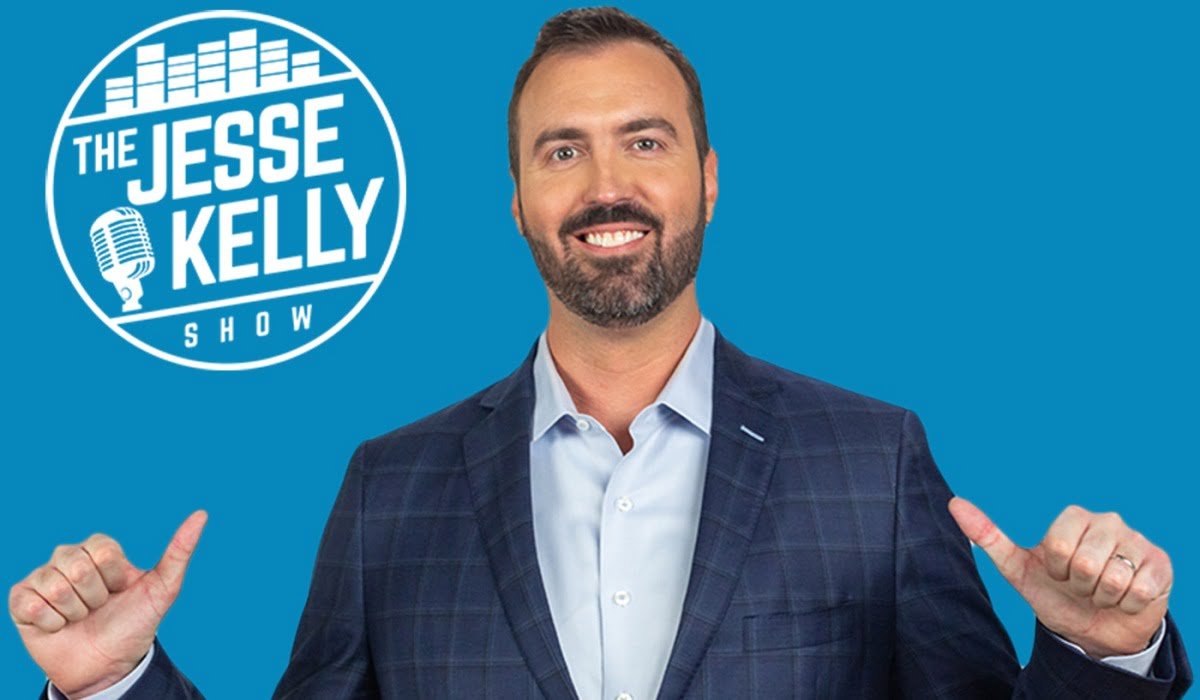LaVar Arrington was once a self-described pissed off dude. He was an angry radio host in Washington DC. That is no longer the case. Arrington now has a different mindset as the driver of FOX Sports Radio’s brand new show Up On Game. He has a much more positive approach and looks for angles that are solution driven. Along with co-hosts Plaxico Burress and TJ Houshmandzadeh, the new show airs on Saturdays from 10am-noon PT.

Don’t mistake Arrington’s positivity for anything hokey or boring; the guy is flat-out interesting. The Pittsburgh native makes many compelling points in our conversation below. He offers opinions on cancel culture and the firing of his former radio partner Chad Dukes.
Arrington doesn’t bite his tongue when it comes to show babysitters in radio either. He also states which big name in the radio industry offered him a great piece of advice. As an added bonus, the former No. 2 overall pick uses the phrase “stretch him out”, which is now easily my favorite phrase of all time. Enjoy.
Brian Noe: Tell me about Up On Game; what makes you so excited about doing the show with TJ and Plax?
LaVar Arrington: I’ve always had this idea that sports media in general has become too driven by controversy and debate. It’s just kind of taken on more of a Geraldo, drama type of feel when you’re talking about athletes and sports. I felt like there was a tremendous gap, a void so to speak, of kind of addressing the market of the youth and sports parents.
I went to Don Martin and Scott Shapiro and was like listen, I’ve got two guys that have stories to tell. They have experiences and these experiences are much like mine in the sense that we take pride in helping the next group of guys coming. We all mentor and teach and help younger guys. I just thought it would be an amazing opportunity to introduce a new way of looking at and approaching athletes in sports, which was solution-based and positive-based and not debating, just talking sports and giving real viewpoints. Just like the name of the show; putting people up on game as to why something happened from our perspective, how you could avoid it, or how you could do better moving forward. Just a breath of fresh air if I could use any type of way of describing it.
BN: How far back do you go with TJ and Plaxico?
LA: A funny story about TJ is I never met TJ as a player. When we retired, I came out here to do NFL Network. Me and Antonio Pierce are really close and so I ended up coaching at Long Beach Poly. TJ coached at Long Beach too so we met each other and have been tight ever since. That’s got to be going on five years ago now that we met and started being cool.
He’s the reason why I got back into media. I was out of media after I left the network. He told me, he was like man I do these spots over at FS1. He was like you need to come over to FS1 and see what’s going on. I did, man. Charlie Dixon and those guys, Jason Whitlock, they ended up giving me an opportunity, Colin, they were all bringing me on their shows.
BN: How about Plaxico? How long have you known him?
LA: I’ve known Plaxico since college. We go way back. We played against each other since college. He went to Michigan State and I went to Penn State. I’ve known Plex for a long time because we’re from the same class. I guess me and TJ are from the same class kinda sorta as well but Plaxico was always a higher-rated dude. I was always a higher-rated dude. So we met in high school, college-type stuff on the circuits.
BN: Were you able to hit either of those guys on the football field?
LA: I don’t even think I played against TJ. As far as Plex, I never got a chance to stretch him out. I would have loved to have had an opportunity to get him. I’ve played against him multiple times and we even ended up being teammates the year before the first Super Bowl in New York.
BN: I like that, stretch him out. [Laughs] Are you guys doing the show remotely right now?
LA: Me and TJ go into the studio and Plex is on the comrex.
BN: How would you describe the way your sports radio style has evolved over the years?
LA: I used to be pissed off and I’m more enlightened now. I always tell people it was rightful for me to be pissed off because I covered the Washington Football Team. After a while, I did five hours of radio and I did it with Chad Dukes. Chad Dukes was mad and like an upset dude. We were just two upset dudes doing radio.

I just got tired of talking about how bad our teams were. Everybody was like he hates his team, this and that, and in a way they were right. I didn’t hate the team; I just didn’t like the owner. But I think it came out in the way that I delivered my information. I know it did listening to myself, just taking inventory and studying my style. There definitely was more anger behind my energy. My evolution has just been really — even when I’m on Speak For Yourself on television — every angle that I take is pretty solution driven and pretty positive even if it was something negative that took place.
BN: What was your reaction to Chad getting fired last month?
LA: I hit him up and I just told him straight up I know you to be an a-hole. I don’t know you to be what they accused you of being. He has a weird sense of humor and a weird sense of how he entertains. That’s why he has such a very dialed in and focused audience. A lot of the things that come from him and the way he sounds at times, it tows the line. It definitely has towed the line and maybe has even stuck a toenail or a toe over the line, but what I’ve learned about radio is that radio is supposed to be a forum where you can communicate how you feel.
I just feel like if it doesn’t go too far, you’re still exercising the right to paint a picture that represents some part of the population that’s out there whether you like it or not. If you got in trouble for what Chad got in trouble for, from what I allegedly hear, there would be no Howard Stern. There would be no Rush Limbaugh. Eventually some of them got hit up, but you’re still talking about some of the most influential heavyweights of radio that would have never gotten an opportunity. They would have been fired because something they said would have offended somebody.
BN: Do you think it’s good that the standards are higher, or do you think it’s constricting to some artists who can’t get away with what they could have before?
LA: Well I don’t make the rules, I play by them. Whether I think it’s right or whether I think it’s wrong, I will say this, I really believe that people should understand the power of what they bring to the table and to put people in a place where they feel as though it’s right for them to look at a certain group of people a certain type of way. If that’s how you’re using your platform, I think it’s dangerous. And I think it’s dangerous more so now than it’s ever been because people have voices. I think it’s dangerous these days because people are more aware and there seems to be more awareness just towards these types of behaviors.
I never realized how chauvinistic the business can be. When Joe Namath said to Suzy Kolber I want to kiss you, could you imagine if he said that today? You know what I mean? Could you imagine in the social climate that we live in today, Joe Namath doing that? He’d be one of the biggest villains. He goes from being beloved to a villain.
I don’t know what’s right or what’s wrong in terms of what people’s liberties should be in being able to talk about and discuss what they want to talk about and discuss. I just know there is the idea of presenting the different sides. I understand that. Will that get lost in cancel culture? It might.
I think cancel culture is kind of a product of just how connected the world has become through social media. We’ve always had a mob mentality. That just goes back into time. The mob mentality is now on 150,000 steroids. It’s an overkill of steroids with cancel culture and the mob mentality. One influencer says vote for this person, you’re going to vote for that person whether they can do it or whether they can’t. You’re going to vote for him because the cancel culture, the mob mentality, it’s there. An influencer can have you do what they want you to do. That can be great and that can be horrible all at the same time.
Why this show is so important, you just got to put things into the proper perspective and understand that we all have a voice and we all have some things that we have to get off our chests. At times you should be able to get those things off your chest without you always being labeled something. There are a lot of things that I have started to not say in media and in social form because you just don’t know.
BN: When did you initially break into sports radio and why did you want to do it?
LA: I wanted to do it because I didn’t feel like we, as the athletes, had enough voices representing us the right way. I wanted to get into media and provide a perspective and an angle that was unique to us, the player and the athlete, that really took the time to see what it was and understand it for what it was versus just talking crazy about what somebody is doing.
I’ve always kind of been a part of media even when I played, but I think I started working with Comcast SportsNet, man, I don’t remember, bro. It’s been a long time. It had to have been maybe ‘08 that I started doing stuff with them. Then I think ‘09 was when I went into radio. Whatever year it was that they launched The Fan in DC. They launched it with me as one of the anchor shows. I was the afternoon drive show with Chad.
BN: What’s the best piece of advice you’ve gotten, or something that you figured out on your own about doing good sports radio?
LA: When you create the identity of what your show is going to be, you need to live within the identity of what you’ve created. Don’t deviate from the values and just what you want the listener to understand about the identity and the values of the show when they’re listening. People will either agree or disagree but they will invest enough of an emotion to come up with some type of a conclusion.
BN: That’s good, man. Is that what you figured out?
LA: I was actually taught that.
BN: Who taught you that?
LA: Whitlock.

BN: Interesting. What other things has he said or anybody else said that you thought was impactful?
LA: I’ve learned a lot from a lot of guys. Mike Harmon has been super instrumental in my development as well in radio. I co-host with him. I’ve learned a ton from him in terms of just my approach of how to get in and out of segments, how to approach the topics that we’re going to talk about, and just how to prep. Knowing how to not talk over one another or understanding how to present your points.
There’s a very distinctive way of how I approach each topic. Answer the question first. Or if you’re presenting something and you’re the one driving it, make sure that you set the table before you begin to try to eat. Nobody can eat if you don’t set the table. You’ve got to just follow the process, a very strict process, of how to go through your segments depending on if you’re the driver or if you’re a passenger in the studio seat, it doesn’t matter. There’s still a process that you have to follow and I didn’t always know that.
BN: Is this the first time you’ve done a three-man show?
LA: Radio wise, yeah.
BN: What’s it like for you to get a feel for that setup?
LA: Well I’m the driver of the show so it’s a challenge. But I feel like I’ve done so much radio at this point, I’ve done so much media at this point that I’ve gotten so many reps doing shows with three or four or more guys. I’ve worked with The Junkies at times; I’ve done Speak For Yourself where it’s a panel of four on the set. That’s harder. It’s harder with four men on television than it is three guys on radio. I’ve gotten great reps in terms of understanding how to manage the flow of multiple guys.
I like the challenge of it and it excites me because you have three very strong personalities, three very pronounced personalities. As long as we can manage how we’re moving and directing traffic, it’s going to be amazing radio and I don’t ever see that being an issue.
BN: Besides the positive tone of the show, what are some other things that you think will appeal to listeners?
LA: I would love for people to really take the time to listen to the show. It’s only two hours. It goes by really quickly, but we prep. We do prep calls and everything. Some of the things that happened on the show we hadn’t even discussed. I think that’s the coolness of this show is that you’re going to hear some things — like I didn’t even know that a lot of people attribute the Bengals/Steelers rivalry to when TJ Houshmandzadeh cleaned his spikes off with the Terrible Towel. I didn’t even know that. Jerome Bettis says it on the show. That was the first time I’ve ever heard that. It was the first time I had ever heard how TJ even got ahold of a Terrible Towel.

For me it was like oh my gosh; that’s when I knew we had the potential to be one of the biggest shows in all of sports radio because of the organic approach and the open approach. The one part of it that people should know is that we are not taking a hands-off approach to the vulnerability of what we’ve gone through. It is very in your face. It’s okay to talk crazy about something that another athlete or another person is going through, but to be able to do it with yourself, to me that is the differentiator. You have to be comfortable enough to be in that forum and be able to talk about things that you’ve gone through that you aren’t necessarily proud of.
BN: That makes for good radio, man. How did TJ get the Terrible Towel?
LA: He purchased it off of a fan, man, that had just bought it. He randomly was on the elevator with a Steeler fan that had just bought a Terrible Towel.
BN: Wow, I would love to know who that fan is. That’s a huge offense to Steeler Nation.
LA: And if they didn’t listen to our show, they probably don’t even know that their purchase that day would fatefully lead to the starting of a rivalry between two franchises and two cities.
BN: As far as your future goals, what do you think would make you the happiest going forward?
LA: Well the happiest going forward is just having the opportunity. Don and Scott believing in the concept that I pitched to them, getting behind me, and continuing to teach me and school me up on how it all works has been a tremendous deal. I’m super happy with where we are. I’m definitely poised for us to create a new brand and usher in a new way and looking at former athletes or even current athletes and how we can handle ourselves in media.

It would really make me happy to pioneer. I always say — and no offense to the Mike Harmons and Steve Hartmans who I’ve worked with or even a Chad Dukes — I think there’s something to be said about not having a show babysitter. I’ve always felt like in the past, host or co-host is like a code word for babysit the athlete. There is a place for those types of media personalities. It’s not meant as an attack or a slight on them, everybody has a role to play, but what I’m saying is just maybe there should be some shows out there that don’t have to have a babysitter on the cast.
Brian Noe is a columnist for BSM and an on-air host heard nationwide on FOX Sports Radio’s Countdown To Kickoff. Previous roles include stops in Portland, OR, Albany, NY and Fresno, CA. You can follow him on Twitter @TheNoeShow or email him at bnoe@premierenetworks.com.







